 Have been travelling...and trapezing...will update soon.
Have been travelling...and trapezing...will update soon.
Monday, June 26, 2006
Thursday, June 22, 2006
7pm EDT: This kid just got a year older in Ireland...
 ...but she's still 26 in New York! Ah, these precious five hours of remaining youth. How shall she spend them? Finishing her novel? Considering her future? Mindlessly surfing online?
...but she's still 26 in New York! Ah, these precious five hours of remaining youth. How shall she spend them? Finishing her novel? Considering her future? Mindlessly surfing online?
Yeah, probably the last one.
Posted by
hesitant hack
at
6:07 PM
9
comments
![]()
Labels: my fragile ego
Doyle and Enright give The Irish Times what for
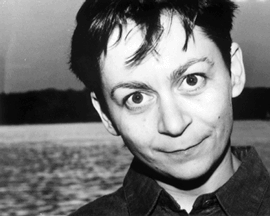 It's a pity that Eileen Battersby, Literary Correspondent of The Irish Times didn't elaborate on the barbed comments directed at that newspaper, and at Irish literary critics - that is, directly at her, among others - by Roddy Doyle and Anne Enright during their public interview as part of last week's Dublin Writers' Festival. Perhaps it was just mentioned in passing, but this is all her report had to say on the matter:
It's a pity that Eileen Battersby, Literary Correspondent of The Irish Times didn't elaborate on the barbed comments directed at that newspaper, and at Irish literary critics - that is, directly at her, among others - by Roddy Doyle and Anne Enright during their public interview as part of last week's Dublin Writers' Festival. Perhaps it was just mentioned in passing, but this is all her report had to say on the matter:
Both he and Enright shake their heads over what they see as the ongoing stupidity of The Irish Times, all that is wrong with society is invariably reflected in its cosy pages. They also agree that there are currently 40 good Irish writers and no good literary critics, "the film critics are even worse."
 Firstly, 40 good living Irish writers is too generous an estimate. It really is. It sounds like a figure pulled out of the air, possibly as a joke. I can think of maybe 15 good Irish writers. Maybe, just maybe, 20. In fact, I'm going to try and write a list, and see how many I can come up with. I'll update later.
Firstly, 40 good living Irish writers is too generous an estimate. It really is. It sounds like a figure pulled out of the air, possibly as a joke. I can think of maybe 15 good Irish writers. Maybe, just maybe, 20. In fact, I'm going to try and write a list, and see how many I can come up with. I'll update later. Secondly, on the cosiness of the Irish Times: Fair play to Battersby for mentioning the comments, I suppose, even if she doesn't do much more than tack it onto the end of her article. I have to wonder whether Doyle and Enright gave a fuller idea of what they meant by cosiness when they used that word (if they used that word - it's not in quotes). Were they talking about the newspaper as a whole, about the arts coverage, about the books pages, about the opinion pages, about the Saturday magazine, to which Enright herself is a reasonably regular contributor? (It looked like she might have been taking over Roisin Ingle's column for a while there.) It's difficult to respond to their criticism without knowing.
Thirdly, and related to this last point: the dearth of good Irish literary critics. I have mixed feelings on this. Ireland does not exactly boast a vibrant and strengthening critical climate where literature and the arts are concerned, but I don't for a minute agree that there are no good Irish literary critics. Again, it would be good to know what they mean by critics - if they're talking just about critics of fiction, or if they mean critics of every form of writing, from poetry to history and biography. It's unclear, too, whether they refer to academic critics, novelists who review novels, journalists who review anything they're handed, or a mixture of all three. Even if it is a mixture, I can think offhand of examples from all three fields who I count as fine critics. Again, I'll try to update with a fuller list, but here are some critics, or reviewers if you want, who publish in Irish newspapers and journals, and whose writing I respect: Nicholas Grene (academic). Colm Toibin (novelist). John Banville (novelist and former literary editor of the IT). Declan Kiberd (academic). Dennis O'Driscoll, Peter Sirr and Vona Groarke (poets). Susan McKay (political journalist and book reviewer). William Wall (novelist, who wrote brilliantly on Irish poetry in the magazine the Shop a few months ago). There must be others, and I know I'm sticking too closely to the reviewers of the Irish Times, but really where else do you look for a serious and dedicated book review section? There's also the Irish Book Review, which has some good reviewers, but it seemed, in its early issues at least, overly cliquey and unlikely to display any real diversity or unpredictability in its views on Irish books. Also, the reviews in those early issues were just plain poor; often badly written, and either petty or parochial.
On film critics: Donald Clarke is very good. Apart from him - and I doubt Enright and Doyle were even thinking of the internet as a valid source of reviews or criticism - I look mainly to blogs for reviews of film and for other criticism. But it's true, there's nobody in Irish film criticism of the calibre of, say, Anthony Lane. That said, what real outlets would there be for someone writing longer, more considered reviews like his? (I haven't read Film Ireland for a while. Maybe it has reviews like that? I don't know.)
I notice they didn't touch on theatre criticism, nor would I expect them to in this context. That's a whole other day's work.
I'd say that Doyle and Enright made for a formidable team once they got going together on this. They're both outspoken, eloquent, sharply intelligent and utterly intolerant of bullshit. If they were given an hour to talk about newspapers and literary criticism in Ireland, I'd be on the next plane home to hear them. I'd also hope for a slightly fuller account of the debate in the paper the next day (or six days later, whatever you can manage), but that's just me. And, like I say, the comments were possibly just part of a really rapid-fire discussion, and were not dwelt upon long enough to merit a fuller mention.
Some other features of the interview (Enright interviewed Doyle), from Battersby's article today:
• Doyle didn't suffer fools from the audience gladly. He doesn't suffer windbags gladly either. Or maybe he just didn't suffer audience members, full stop. A woman wanted him to know she didn't enjoy The Commitments; he seems not to have bothered even to reply. A man wanted to know about his views on "religion and churches". "I'm an atheist," Doyle responded bluntly. That was the end of that.
• Doyle admitted that the actor Ger Ryan's interpretation of his character, Paula Spencer, in the stage version of his novel The Woman Who Walked Into Doors had made for a "different, stronger" version of the character and that, as he wrote the sequel to the novel (which will be published in September), he was aware of the challenge this posed to his own characterisation of her. At least, I think that's what he's saying. Maybe he's talking about the stage version, which he helped to adapt. Again, it's a little unclear. But if this is the challenge he's talking about, it's a very interesting one, and I guess one that other authors have faced too, as they write sequels, or the next book in a series.
• He talked about the number of "wrecked, baldy old guys" who come up to him in the street and tell him that he used to teach them. Others, or maybe the same guys, are "recovering heroin addicts...the ghosts of young kids he used to teach," writes Battersby.
• Enright came across, writes Battersby, "as a harassed housewife on temporary day release from her children," and complains that she has no time to read. But she's shrewd and alert as an interviewer, and knew "how to turn an interview into an apparently casual conversation. She [was] also asking Doyle the right questions." Another reason why she should write for the Irish Times, then. Sign her up!
• Doyle would love to live in New York. You can stay with us, Roddy. Just for a couple of days, mind.
• The recent changes to Ireland's population, which have seen large numbers of immigrants come to the country over the last five to seven years, have created an unexpected bonus for Doyle, who's a pretty recognisable figure in Ireland, as writers go: "I can walk down the street without every tenth person asking me if I'm Roddy Doyle." He also mentions in passing that he's learning Polish. Is he? Was this said ironically (he also said he's the only person on his bus route now who speaks English) or in dead seriousness?
• As was already known (it was discussed at some length in Angela Bourke's biography, and in Doyle's book Rory and Ita), Doyle's second cousin was Maeve Brennan, the famous Irish New Yorker writer, who wrote the magazine's Talk of the Town column during the 1950s and 60s under the pseudonym of the ”Long-Winded Lady”. Doyle spoke a little about her on Friday; he was 14 when she came to stay in his family home for a few months. That would have been around 1972, when things had begun to fall apart for Brennan. She rarely ate, stayed in her room with the curtains closed, and wrote furiously. Doyle, on Friday, remembered her as "incredibly elegant and eccentric", bewildered by an Ireland she no longer knew. He didn't speak to her about writing, because he wasn't interested in it at the time.
• Enright talked about something interesting: the emergence of an underclass in Dublin, or in Ireland (not clear which), and how this is something different to the working-class. Again, more on this would have been fascinating, but perhaps space didn't allow it...or something... anybody who was there, please comment!
• Doyle on the linguistic gift of the working class (in Dublin, I think): "A well-aimed working-class insult can do in two sentences what it would take a barrister three days to do."
• After they made their '40 good writers' remark, the audience got involved, shouting out the names of other Irish writers to see what Doyle and Enright had to say about them. Battersby remarks that "the expected [were] praised". It'd be good to know who the praised and the unpraised were, but only one is named in the piece: Jennifer Johnston, whose work Doyle said he loved. It's the duty of the writer, he said, "to produce good work."
Yeah, and it's the duty of the literary journalist too.
Posted by
hesitant hack
at
3:36 PM
6
comments
![]()
Labels: books, criticism, irish media
That's Stephen James Joyce to you...
 What do we think of Stephen Joyce around these parts? Sorry, Stephen James Joyce, to give him the full name upon which he insists. Well, we think that it would be fascinating to see SJJ’s response if all the scholars and critics stopped showing an interest in Joyce’s writings, and in his life, all of a sudden; if the Joycean industry drew to an unceremonious halt. And people stopped reading, and stopped analysing, and stopped thinking about SJJ’s grandfather. Because that’s what you want, isn’t it, SJJ? That’s what you mean when you tell D.T. Max, in this week’s New Yorker, (ETA: now last week's...this has been on the backburner for a while, sorry) that academics are like “rats and lice” and “should be exterminated”, isn’t it? That academics are “people who want to brand this great work [Ulysses] with their mark”, and that you “don’t accept that”?
What do we think of Stephen Joyce around these parts? Sorry, Stephen James Joyce, to give him the full name upon which he insists. Well, we think that it would be fascinating to see SJJ’s response if all the scholars and critics stopped showing an interest in Joyce’s writings, and in his life, all of a sudden; if the Joycean industry drew to an unceremonious halt. And people stopped reading, and stopped analysing, and stopped thinking about SJJ’s grandfather. Because that’s what you want, isn’t it, SJJ? That’s what you mean when you tell D.T. Max, in this week’s New Yorker, (ETA: now last week's...this has been on the backburner for a while, sorry) that academics are like “rats and lice” and “should be exterminated”, isn’t it? That academics are “people who want to brand this great work [Ulysses] with their mark”, and that you “don’t accept that”?
But you like your own mark on Ulysses, and on the rest of the Joyce estate, to be clearly visible. In fact, along with the Great Wall of China, it can probably be seen from space. That’s unusual for a big, grubby set of fingerprints, but you’ve proven that nothing’s impossible. You say that if you had “the energy”, you’d write a book about your grandfather, and about how he was treated by Ireland. You don’t mention whether or not you think yourself to have the talent to do that, though. To write a book. Funny that you never have. Don’t you feel capable? Do you wish you were as famous as your grandfather? Could that be what all of this fuss is about?
Below, some highlights from Max’s excellent New Yorker piece, which I think give an insight into the mind of the man.
In 1988, he took offence at the epilogue to Brenda Maddox’s Nora, a biography of Nora’s wife, which described the decades that Joyce’s schizophrenic daughter, Lucia, spent in a mental asylum. Although the book had already been printed in galleys, Maddox, fearing a legal battle, offered to delete the section: the agreement she signed with Stephen also enjoined her descendants from publishing the material. Shortly afterward, at a Bloomsday symposium in Venice, Stephen announced that he had destroyed all the letters that his aunt Lucia had written to him and his wife. He added that he had done the same with postcards and a telegram sent to Lucia by Samuel Beckett, with whom she had pursued a relationship in the late nineteen-twenties.
SJJ wrote at the time that he had not destroyed any papers or letters in his grandfather’s own hand – “yet”. But in the 1990s, he persuaded the National Library of Ireland to give him some Joyce family correspondence that was scheduled to be unsealed. Scholars worry that these documents, too, have been destroyed.
In 2004, the centenary of Bloomsday, Stephen threatened the Irish government with a lawsuit if it staged any Bloomsday readings; the readings were cancelled. He warned the National Library of Ireland that a planned display of his grandfather’s manuscripts violated his copyright. (The Irish Senate passed an emergency amendment to thwart him.) His antagonism led the Abbey Theatre to cancel a production of Joyce’s play “Exiles”, and he told Adam Harvey, a performance artist who had simply memorised a portion of “Finnegans Wake” in expectation of reciting it onstage, that he had likely “already infringed” on the estate’s copyright. Harvey later discovered that, under British law, Joyce did not have the right to stop his performance.
Ok, let’s pause here to think about that last one. By memorising a part of of Joyce’s work, an artist had violated copyright? D.T. Max’s article maintained a tone of appropriate distance from its subject, and somehow did not at any point erupt into exclamations of disbelief and disgust, but I don’t know for the life of me how he managed to resist the temptation. Probably David Remnick himself had to stand him a couple of strong brandies. You have to admire Max for writing this article without once using the words “insane”, “control-freak” or “roaring maniac”. Not about anybody in particular, that is. Just saying.
Let’s go on.
Stephen has also attempted to impede the publication of dozens of scholarly works on James Joyce. He rejects nearly every request to quote from unpublished letters. Last year, he told a prominent Joyce scholar that he was no longer granting permissions to quote from any of Joyce’s writings. (The scholar, fearing retribution, declined to be named in this article). Stephen’s primary motive has been to put a halt to work that, in his view, either violates his family’s privacy or exceeds the bounds of reputable scholarship.
Quoting from unpublished letters is one thing; though I’m firmly of the belief that the contents of unpublished letters can further the understanding of what drove and shaped an author’s work, and matter deeply for the development of serious scholarship around that work, it’s fair enough that an author’s estate gets to lay down conditions about the use of that content. They are personal documents, after all. Most estates are a lot more reasonable than SJJ, but I accept that, where the letters are concerned, his is the final word. However, the matter of quoting from Joyce’s published work is an entirely different one. The idea that he would prevent scholars, critics and artists from quoting from Dubliners or Ulysses on the grounds that such use somehow “violates his family’s privacy” begs further explanation. As does the notion that SJJ would somehow know, even before reading requests from scholars for the use of such quotes, that any use whatsoever would “exceed the bounds of reputable scholarship”. More from the whirring Eureka-vortex of SJJ’s brain, please! Here’s a suggestion for the next step: stop bookstores stocking the books, or, at the very least, stop them from displaying the books on their shelves in a way that the titles are clearly visible. Because that’s sort of a violation of copyright, too. And, come to think of it, so is the act of reading Joyce. Especially if you’re one of those people whose lips move as they read. Or, if you sometimes, for some reason, read aloud. For example, if you were reading to your precocious offspring from the pages of Joyce’s children’s book, The Cat and the Devil, based on a letter-story that your grandfather sent to you when you were a boy. Yes, don’t worry, SJJ, everybody knows that The Cat and the Devil, like all of Joyce’s writings, is really, secretly, essentially, at base, all about you! Don’t worry. You’re at the centre of everything to do with Joyce. As Max, in perhaps the article’s most pointed paragraph, points out:
The two-decade-long effort has also been an exercise in power – an attempt to establish his own centrality in regard to anything involving his grandfather…as he put it to me during two phone calls that he recently made to me from La Flotte, “What other literary estate stands up the way I do? It’s a whole way of looking at things and looking at life.”
And just a couple more samples of SJJ’s inimitable style:
When turning down a request for permission from an academic whose work was going to be published by Purdue, he said that he objected to the name for the university’s sports teams: the Boilermakers. (He considered it vulgar.) Michael Groden, a scholar at the University of Western Ontario, spent seven years creating a multimedia version of Ulysses, only to have Stephen block the project, in 2003, with a demand for a permissions fee of one and a half million dollars. (Before Stephen controlled the Joyce estate, such fees were nominal.) Groden’s sin was to have praised Danis Rose’s edition of Ulysses as “confident and controversial,” in a reader’s report for Rose’s publisher; he had also helped the National Library of Ireland to evaluate some Joyce drafts prior to acquiring them.“You should consider a new career as a garbage collector in New York City, because you’ll never quote a Joyce text again,” Stephen told Groden.
This week, Laurence Lessig, a law professor at Stanford, will file a suit against SJJ in United States District Court. He’s acting on behalf of the author Carol Loeb Shloss, whose book on Joyce’s daughter Lucia was published in 2003. The book was about Lucia’s mental illness, and before it was published, SJJ made clear to her publisher that he would sue if she quoted from copyrighted material. The book was published with cuts. While Shloss was fighting with SJJ, she met Lessig, a copyright specialist, who agreed to take on her case pro bono. He wants to show, to quote Max, that “distended copyright laws [are] not in the public interest.” His case this week will be the first to accuse a literary estate of “copyright misuse”.
Shloss’s book, it should be said, is by no means an example of why scholars should be allowed greater leeway when it comes to quoting from copyrighted Joyce material. There’s something decidedly sensationalist about her project; to probe into the mental illness of Joyce’s daughter is hardly an exercise in Joycean scholarship. So in a way her case is not ideal as a challenge to SJJ’s grip on the estate. But then, Lessig’s not challenging the grip itself so much as he is challenging the way SJJ wields that grip. During Shloss’s attempt to publish her book, she and her publisher received letters and phone calls of a threatening manner from SJJ. She alleges he was practically spying on her at one stage, and that he made concerted attempts to block her research - by removing documents from libraries, for example. It’s against that kind of behaviour on the part of an estate that Lessig is taking a lawsuit. Intellectual property specialists think he’s unlikely to succeed; the precedent such a success would set for estates would be too drastic. But it’ll certainly be an interesting one to watch.
Posted by
hesitant hack
at
3:19 PM
5
comments
![]()
Labels: books, criticism, the new yorker
Things You Really, Really Need To Know Today. Really.
• You know what the gays have most pride in this week? Soon, if their cunning plan for marriage rights works out, they'll be able to marry snakes. [Wall Street Journal's Daniel Henninger, six comments from the end, likely only half in jest.] Lucky bastards. Below, Stephen Colbert tells it his way. [YouTube]
• Why, oh why, must America fall for the Victoria Beckham thing? Having emigrated largely to get away from endless magazine covers showing her bones-where-no-bones-should-be, now I have to see her all over the newsstands (ok, cyber-newsstands) here, too. At least until her withered internal organs finally collapse in about a year's time. [Hollywood Tuna]
• Neil Jordan's new film is called The Brave One and his method as a director includes much jiggly-paunch-pacing, head-rootin' and grumpiness to nosy onlookers. And having cars towed away at 7 a.m. [The Reeler 1 and 2]
• Zahara Jolie-Pitt is going to nut that new kid, first chance she gets.
• Gawker puts Makey-up-Million-Pieces writer James Frey on suicide watch. Suggestion: a quick way to end it all would be to cycle the wrong way up East 88th crash-bang onto Neil Jordan's set.
Posted by
hesitant hack
at
12:27 PM
0
comments
![]()
Labels: mindless trivia, New York
Wednesday, June 21, 2006
Oh, to be twelve again...
 You've got to love this picture from last night's Irish premiere of The Wind That Shakes the Barley. Look at the big red cheeks on that little girl taking the close-range photograph of Cillian Murphy! She's finally face to face with her poster-boy, and she's only scarlet, like...
You've got to love this picture from last night's Irish premiere of The Wind That Shakes the Barley. Look at the big red cheeks on that little girl taking the close-range photograph of Cillian Murphy! She's finally face to face with her poster-boy, and she's only scarlet, like...
By the way, you can see a trailer for the film here.
Posted by
hesitant hack
at
1:45 PM
0
comments
![]()
Labels: mindless trivia
Alice Munro to retire?
 Via the Elegant Variation comes very sad news: Alice Munro is expected to announce tonight, at a fundraiser in Toronto, that she has written her last book.
Via the Elegant Variation comes very sad news: Alice Munro is expected to announce tonight, at a fundraiser in Toronto, that she has written her last book.
Munro is scheduled to give a reading at a benefit and book launch for Writing Life, a PEN Canada anthology of essays from 50 Canadian and international authors that is scheduled to hit stores July 1. In her contribution to the volume, Munro cites a tremor in her writing nerves in the face of constant interruptions and advancing age. (She will be 75 next month.) She says she can quit writing "in the interests of a manageable life" and with the knowledge that it's rare for outstanding work to be produced in a author's later years, "so one or two books fewer won't really be anybody's loss."
Many will beg to differ.
She is a master of the short story, and her work, in its sober, exact beauty, recalls that of another writer whose pen fell silent too soon, John McGahern. Her next book will be her 13th, another book of short fiction, which is due for a November release. Here's what the MacDowell Colony had to say this year as it awarded her its highest honour, the MacDowell medal:
"Reviewers have often compared Munro to Chekhov, and this is no overstatement. When you close a book of hers, you know a lot more about what it means to be human."
If the rumours are true, her voice will be much missed.
Posted by
hesitant hack
at
11:54 AM
0
comments
![]()
RTÉ and the Arts Council: Going through the motions
 This just in from the Arts Council; the meeting between its director, Mary Cloake, and the Director General of RTÉ, Cathal Goan, took place yesterday. I accept that it's perhaps too much to expect concrete results from just one meeting, but I don't see anything in this press release about a follow-up meeting, and I see little sign, in this outline of the discussion, of concrete promises being given by RTÉ about its future coverage of the arts. Reading between the lines, it looks like little more than a call-and-answer session of the appropriate noises. The noises the Arts Council knows it has to make in this situation, and the noises that RTÉ knows it has to make not to invite more negative publicity. There was plenty of affirmation, and reiteration, and talk of high priorities, but there's nothing new, and nothing binding, in the statements Goan was cornered into trotting out in yesterday's meeting. Saying that the appointment of an arts correspondent is a high priority in no way obliges RTÉ to do anything about making such an appointment. This is pie-in-the-sky stuff. Given that it does not depend on the Arts Council for its funding, RTÉ was hardly even obliged to attend the meeting when it was called by the Arts Council, and it certainly was not obliged to provide Cloake with answers, and with anything other than vague assurances. And it shows.
This just in from the Arts Council; the meeting between its director, Mary Cloake, and the Director General of RTÉ, Cathal Goan, took place yesterday. I accept that it's perhaps too much to expect concrete results from just one meeting, but I don't see anything in this press release about a follow-up meeting, and I see little sign, in this outline of the discussion, of concrete promises being given by RTÉ about its future coverage of the arts. Reading between the lines, it looks like little more than a call-and-answer session of the appropriate noises. The noises the Arts Council knows it has to make in this situation, and the noises that RTÉ knows it has to make not to invite more negative publicity. There was plenty of affirmation, and reiteration, and talk of high priorities, but there's nothing new, and nothing binding, in the statements Goan was cornered into trotting out in yesterday's meeting. Saying that the appointment of an arts correspondent is a high priority in no way obliges RTÉ to do anything about making such an appointment. This is pie-in-the-sky stuff. Given that it does not depend on the Arts Council for its funding, RTÉ was hardly even obliged to attend the meeting when it was called by the Arts Council, and it certainly was not obliged to provide Cloake with answers, and with anything other than vague assurances. And it shows.
The Arts Council raised the serious concerns of the arts community about changes in the RTÉ Radio 1 schedule and the potential downgrading of arts coverage on RTÉ. The Arts Council urged RTÉ to maintain arts broadcasting in the mainstream of coverage rather than solely at marginal times.
RTÉ reiterated its absolute and ongoing commitment to the arts across all its broadcasting services and affirmed that the arts will remain a key priority. RTÉ said the Radio 1 autumn schedule was being finalised. RTÉ is confident that its service to the arts in that schedule will address the concerns expressed by the Arts Council.
RTÉ also said the appointment of an arts correspondent was a high priority.
The meeting discussed the complementary responsibilities of both organisations in supporting the arts, a wide range of joint initiatives, actual and potential, and the central value of the arts in a changing Ireland.
Posted by
hesitant hack
at
10:43 AM
1 comments
![]()
Labels: arts (ireland), irish media
Tuesday, June 20, 2006
Rattlebag
The Rattlebag petition is well on its way towards the 1000 signatures mark - it looks like around 100 people a day are adding their voices to the protest. Do so now, if you haven't already! And pass the message on!
Nobody's saying Rattlebag is perfect as an arts programme, but RTE needs, and deserves, to be shown just how many people are frustrated and disappointed by its rescheduling decisions. A lot of those who have signed this petition are also using it to express their dismay over the axing of the Mystery Train (which, this evening, featured a brilliant and zany monologue by Kelly about when Bob Dylan comes to stay...).
Posted by
hesitant hack
at
3:27 PM
1 comments
![]()
Labels: arts (ireland), irish media
Droit de Suite...but not tout de suite
 The Irish Government has announced the introduction of an Artists' Resale Right, otherwise known as droit de suite (right of continuation), which provides for loyalties to be paid to visual artists - and potentially also to their heirs - upon the resale of their work.
The Irish Government has announced the introduction of an Artists' Resale Right, otherwise known as droit de suite (right of continuation), which provides for loyalties to be paid to visual artists - and potentially also to their heirs - upon the resale of their work.
However, it's taking a staggered approach to the introduction of the legislation in question; instead of bringing the legislation in fully (and thereby enacting the EU directive which, by right, should have been enacted before January 1st of this year), the Minister for Enterprise, Trade and Employment has put in place "temporary measures" which will allow artists to benefit from the Artists' Resale Right "in advance" of full legislation. The Department will continue, as planned, to introduce a new Act of the Oireachtas dealing with Intellectual Property, through which the EU directive will be properly implemented, but because that legislation will not be passed for at least another six months, and because it involves "complex matters" which can not be immediately addressed, these temporary measures are being introduced in the meantime. For the benefit of artists.
And if you believe that explanation, then the disingenuous hype of the last seven days, in which a crooked politician was championed as the greatest friend to the arts since Lorenzo de' Medici, has obviously achieved its desired effect. This is not a touching display of State sensitivity to the arts. It's not even a touching display of legality. Well, legal it is, but just about. What's on display here is the naked back of the Government being covered, once again, with shabby haste.
Here's why. The EU directive on the Resale Right is something about which the Government has known for more than five years at this stage. There was an official deadline for the implementation of that directive, and, surprise, surprise, that deadline (1st January 2006) was allowed to pass. That is, the Government failed to meet it. And the artist Robert Ballagh was entirely within his rights to challenge the Government on this, and he did. He is currently seeking damages from the State due to its failure to do what the EU directed it to do, and introduce full legislation on this issue. Ballagh is claiming damages for revenue lost after the deadline - revenue, that is, which he would have earned from the resale of his work had the directive been properly enacted. Or enacted at all.
And guess when Ballagh's case was due to be heard? Next week. And hence the rushed stopgap measure. Because if a court had found in Ballagh's favour - and it's hard to find any reason why it would not - then the outcome of that case would have implications for all artists whose artworks were resold for more than €3000 since January 1st. Whether Ballagh's case now collapses entirely, or whether he can still sue for revenue lost between January and June, is not yet clear- maybe someone better versed in legal matters can advise on this in the comments. But what is clear from looking at this interim legislation is that the Government has wilfully failed the artists whose rights it has been instructed to protect. These measures meet only the bare minimum of the requirements set out by the EU Directive. They come straight from the bargain basement of Government policy. And they don't inspire much confidence in the shape of the fuller legislation to come. Two of its most charming features:
• A work must be sold for €3000 before Resale Rights (up to 4% of the sale price) kick in. Lobby groups had suggested the much fairer figure of €1000. And just how fair that figure is becomes clear when you look at the thresholds operating in other countries where droit de suite is a given: in Finland, it's €252, in Germany €51, in France just €15. Anybody who is familiar with the Irish art market and with art auctions will know that the scene is small and not hugely competitive, and that you're not at all unlikely to pick up a painting by a significant contemporary artist at, say, the Irish Art Sale at James Adam, for less than €3000. A huge number of artists are going to be left without royalties if this threshold is maintained in the actual legislation. Which really makes a mockery of its introduction in the first place.
• In other fields, artists are protected by copyright. Copyright lasts throughout the artist's life and for 70 years after their death. The EU advised that the Resale Right should be implemented in a way which mirrors the terms of copyright - but left the matter of the actual duration up to individual member states. The Irish Minister has decided, in this implementation, to cut the 70 years clause and limit the right to the artist's lifetime, apparently ignoring the fact that droit de suite was first created as much to benefit artists' heirs as to benefit artists themselves. Perhaps the Government cannot be blamed for baulking at the idea of the full 70 year duration, but that it is not obliged to include a posthumous period in the legislation in no way justifies a complete exclusion. A 20 or even 15 year period, for example, would see to it, say, that any young families might be provided for in some way after the death of an artist parent. It's well known that the work of an artist often soars in value after his or her death, and not difficult to imagine a case where a dead artist's family could face financial difficulty, even as his or her work fetched increasingly high prices at auction.
It's not surprising to see the outspoken Ballagh as the head of this campaign, but I think in a way it's unfortunate, or at least seems a missed opportunity - he's not, after all, representative of the group of artists who are most in need of Resale Rights. He makes real money from his art, and doesn't live in poverty - or if he does, he's the first artist driving a beautiful convertible while also living in poverty that I've ever seen. I admire him for taking this case, but I can't help wishing that he was joined by an artist nearer to the other end of the income scale, someone for whom the droit de suite could be the difference between poverty and subsistence, rather than between less profit and more. Such a case would serve to hammer home even more vividly the need for this legislation, and the need for its future, more fully developed form, to take into account the recognised right of artists to make a living from what they do.
PS: I'm not sure whether, or how, the sale of work online is affected by the existence of droit de suite. Does anybody know? Since moving here, we've bought a few pieces on e-bay, mostly lithographs, and a couple of photographs. One of these was direct from the artist - Luca Paradisi, a photographer based in Cork, whose website is here - but the others were from dealers, and at least one from somebody who just had the print lying around the house for years. There's certainly no mechanism on ebay at the moment to deal with the distribution of Resale Rights, and I can't see the website rushing to incorporate such measures. But, say, if someone is lucky enough to pick up a Hughie O’Donoghue lithograph for €3000 from someone offloading it on ebay, will he now get 4% of that sale?
Again, most work on ebay goes for a lot less than €3000, even if it would fetch that price or close to it in a gallery. It's a bargain for buyers, but from the artist's point of view it's not such a good thing, whether or not resale rights are part of their country's law.
Update, June 23: The resale value will be set at the much more sensible threshold of €1000, reports today's Irish Times Article below the jump.
Resale threshold for artist to get cut set at €1,000
Gerry Smyth
23/06/2006
The value at which artists will be entitled to a share in the resale of their work is to be set at €1,000 in new legislation due before the Oireachtas in the autumn.
The new legislation, which is expected to become law by the end of the year, follows this week's "interim" regulations placing a minimum value of €3,000 on a work of art for it to qualify.
However, the €1,000 threshold limit is the figure for which organisations such as Visual Artists Ireland and the Irish Visual Artists' Rights Organisation have been lobbying, as it would ensure that the majority of artists, including printmakers, would benefit.
Under this week's regulations, artists are now entitled to 4 per cent of resale value of their work and this will be enshrined in the primary legislation which has been drafted in a consultation process between the Department of Enterprise, Trade and Employment and the Department of Arts.
This week's regulations, and the forthcoming Bill, are in response to an EU directive on resale rights known as droit de suite. The State's failure to introduce the resale rights earlier in the year - it was due to be enacted from January 1st - was recently challenged in the High Court by artist Robert Ballagh, whose work frequently comes up for auction.
Under the directive, there is a ceiling of €12,500 on the amount an artist can receive on resale. One issue that needs teasing out when the full legislation comes up for Dáil debate is the duration of resale rights - how far down the family line it should extend beyond an artist's immediate dependants and family. The temporary regulations applies only to living artists.
Under the EU directive, a derogation on payment of the resale royalty to the heirs of deceased artists is available until 2010 but the Government will not seek to avail of this option.
The temporary regulations give artists the right to obtain details about those who sell on their work, but they are unclear about the means of collecting the new royalties, whether it is to be on a one-to-one basis between artist and vendor, or through some more formal arrangement. The legislation, however, is likely to place the onus on the auction houses and dealers.
The interim measures are effective from June 13th, a date on which, coincidentally, a major auction of contemporary Irish art was held by deVeres with work by a number of living artists - Louis LeBrocquy, Donald Teskey, John Shinners, William Crozier, John Doherty as well as Ballagh - receiving high prices.
Posted by
hesitant hack
at
11:28 AM
1 comments
![]()
Labels: arts (ireland)
Snippets
Barbara Epstein, co-editor of the New York Review of Books, has died. [LA Times]
Robert Birnbaum interviews Susan Orlean, author of The Orchid Thief and staff writer at the New Yorker. She talks about the increasing challenge of pitching more offbeat, non-celebrity-centred ideas to magazine editors...though I'm guessing she has it a lot easier than most writers. Then again, if she finds it tough, what hope for the rest of us? [Identity Theory]
Speaking of the New Yorker, there's a blog all about/obsessed with it, which has somehow recruited two anonymous staffers from the New Yorker to answer readers' questions (pre-vetted by the blog, of course) about the magazine. Unsurprisingly, Gawker and some of its readers already have a couple of suggestions:
-Are rejected submissions used as toilet paper?
- How do fact-checkers not kill themselves?
-Are all of your cartoonists bitter divorcees?
-Is it a prerequisite of publication that a short story be mind-numbingly boring and/or have characters who I don't really care about whose names I can't pronounce?
-Must all short fiction submissions end abruptly, sans denouement?
The Middle Eastern edition of Elle will hit newsstands in Lebanon, Jordan and Morocco this Friday. A second, more conservative version of the Lebanese publication will hit Saudi Arabia in October. Along with shoots heavy on accessories and beauty products rather than on clothes, the first issue will feature an article on The Vagina Monologues- which uses synonyms for 'vagina', rather than the word itself, throughout. Challenging. Will Orlean be pitching? [Wall Street Journal]
Posted by
hesitant hack
at
10:47 AM
0
comments
![]()
Labels: books, media, the new yorker
Brooklyn Blogs
 As I mentioned before, I love living in Brooklyn. I don't blog about it enough, though - probably because too many of my reference points are still in Ireland, work-wise at least. But there are some great Brooklyn-based blogs around, which give an idea of what it's like to be here at this (finally) lovely time of year. See, for example, this Brooklyn Life and the Brooklyn Record. Now I have to do some work...
As I mentioned before, I love living in Brooklyn. I don't blog about it enough, though - probably because too many of my reference points are still in Ireland, work-wise at least. But there are some great Brooklyn-based blogs around, which give an idea of what it's like to be here at this (finally) lovely time of year. See, for example, this Brooklyn Life and the Brooklyn Record. Now I have to do some work...
Posted by
hesitant hack
at
7:28 AM
0
comments
![]()
Labels: brooklyn
Sunday, June 18, 2006
You'll Never Clear Your Desk Alone
 It's not just in Ireland that matters to do with the arts are vulnerable to being sidelined by the media. One of the biggest media stories here this week concerned Erik Wemple, the newly-appointed editor of the Village Voice, who, on Thursday, "changed his mind" about taking the job and went back to Washington, where he was previously editor of the City Paper.
It's not just in Ireland that matters to do with the arts are vulnerable to being sidelined by the media. One of the biggest media stories here this week concerned Erik Wemple, the newly-appointed editor of the Village Voice, who, on Thursday, "changed his mind" about taking the job and went back to Washington, where he was previously editor of the City Paper.
What could possibly have forced him to make this drastic decision, given that he'd just accomplished an enviable jump up the career ladder? Some vague noises about ”management differences” were made in the aftermath of the announcement. But turns out that our old friend, De Arts, may really have been the reason for Wemple's sudden exit, as Gawker explains:
From what we hear, Wemple held a two-hour meeting with the staff that went reasonably well until staffers asked if the paper would be asked to use other New Times writers. Wemple said that bringing in outside writers wasn’t in his plans, but the staff informed him the practice has already been imposed, as the Voice has been more or less forced to use film and music reruns from other New Times papers. That’s where things started to sour, because Wemple looked absolutely shocked that this had been going on. He also said he wanted to focus on more arts reporting and criticism, unaware that the arts sections had been significantly reduced.
Long story short, the New Times has hacked things up to the point where the Voice is no longer the paper Wemple thought he was signing up for. Management wanted Wemple, who’d been assured of autonomy — but then he got smacked with an alternate reality upon arriving in New York.
You can’t blame him for walking right back out the door.
Posted by
hesitant hack
at
8:03 PM
0
comments
![]()
Labels: arts, irish media, media
Renegades
 This was on in our local park in Brooklyn this weekend, which made me want to spend all my savings on jewellery, handbags and notebooks. And on very cute baby clothes for babies I don't even know yet. It also reintroduced me to Bust, the magazine to which I subscribed a few years ago after reading an article about it in one of the Irish Sunday newspapers - written, unsurprisingly (given that it was actually about something interesting...) by Stellanova. My flatmates were a bit bewildered by this bastion of tough girliness which came through the letterbox every couple of months, and my then-newly-acquired boyfriend, A, confessed that, having seen it where it was stocked in Tower Records, he'd wondered if it was a lesbian porn magazine. Well!
This was on in our local park in Brooklyn this weekend, which made me want to spend all my savings on jewellery, handbags and notebooks. And on very cute baby clothes for babies I don't even know yet. It also reintroduced me to Bust, the magazine to which I subscribed a few years ago after reading an article about it in one of the Irish Sunday newspapers - written, unsurprisingly (given that it was actually about something interesting...) by Stellanova. My flatmates were a bit bewildered by this bastion of tough girliness which came through the letterbox every couple of months, and my then-newly-acquired boyfriend, A, confessed that, having seen it where it was stocked in Tower Records, he'd wondered if it was a lesbian porn magazine. Well!
Bust had a stall at the craft fair, as did Venus, as did zillions of amazing craftsters. I picked up business cards from the best ones and will post links to their websites as soon as I get out of this bar where I came to 'work'. Air-conditioned, y'know? And, um, Corona. Ahem. Look, it's Sunday night, ok?
• Notebooks made from old hardbacks – Nancy Drew included: Scraps of Paper
• Robots crafted from computer innards: Burrowburrow
• Cute ceramics: Perch design
• Bags & stuff. Drool-inducing: Kristen Aronsson
• Odd self-portraiture: Enid Crow
• Hand-forged belt buckles: Steel Toe Studios
• Jewellery made from silver-cast twigs and acorns: Twigs and Heather
• Wallets, bags, etc, in colourful leather: Miss Alison
• Gorgeous prints and lithographs: Cinqunquatre
• More bags and t-shirts: Slaughterhead Design
Posted by
hesitant hack
at
7:34 PM
4
comments
![]()
Labels: brooklyn, girl stuff, my little shopping problem
Still in Time for Father's Day...
 I don't know how much this costs, but you can actually buy it from this website. Now, if they could only add a magazine rack, for unread issues of the New Yorker, I'd be sold...
I don't know how much this costs, but you can actually buy it from this website. Now, if they could only add a magazine rack, for unread issues of the New Yorker, I'd be sold...
Or (thanks, Sinead), you could listen to a poem in there...
Posted by
hesitant hack
at
5:56 PM
0
comments
![]()
Labels: mindless trivia
The Heat...
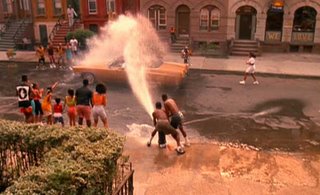 ...has come. 90 degrees out there. And I love it. When it's like this, I could walk around Brooklyn forever. And even if my Brooklyn is more Bedford Avenue than Bedford-Stuyvesant, I'm still using this pic from Spike Lee's Do the Right Thing.
...has come. 90 degrees out there. And I love it. When it's like this, I could walk around Brooklyn forever. And even if my Brooklyn is more Bedford Avenue than Bedford-Stuyvesant, I'm still using this pic from Spike Lee's Do the Right Thing.
Posted by
hesitant hack
at
5:37 PM
2
comments
![]()
Saturday, June 17, 2006
Inishmore: Curiosity Killed the Cat
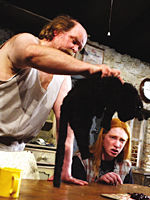
I finally got along to see Martin McDonagh's The Lieutenant of Inishmore at the Lyceum last night. I know I've mentioned it in posts before, and blogged about events around it, but I hadn't had a chance to actually see the play yet....oh, alright, I'd been putting it off because I'm incredibly squeamish, and five gallons of fake blood, plus a rake of severed limbs, blinded animals and disembowelled cats sounded like it might be more than I could take. But I knew curiosity would get the better of me eventually, and so yesterday evening, A and I rushed it (meaning we got student rush tickets, for $25, an hour before hte performance). He'd seen it already, two weeks ago when some friends had a spare, and he'd thought it extremely funny, and after last night I'm already thinking about when I can see it again before leaving for Dublin at the end of next week.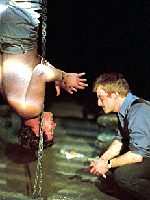
It is hilarious, whip-sharp and very, very clever, and definitely lives up to the hype.
I was really disappointed, though, to see that David Wilmot wasn't playing the role of Padraic, presumably due to that strained voicebox he was suffering from on the night of the Tonys, and that the understudy was in the part instead. But watching said understudy, Brian Avers, in the part was like watching a mirror image of Wilmot. The job of understudy here is taken very seriously - for long, long runs on Broadway, after all, understudies are vital - and not only do they attend rehearsals, but they get paid for it just as they would if they were actually in the cast proper, and they're featured prominently in the programmes. And the performance of Avers last night, and of David Wilson Barnes, the understudy for Jeff Binder's character, Brendan, I can understand why. These guys gave flawless turns. Avers practically was Wilmot - acccent, enunciation, stance, facial expressions, everything - and there was no sense of disjointedness, of the cast not gelling together properly, of second-best. From the outset, this cast was on fire.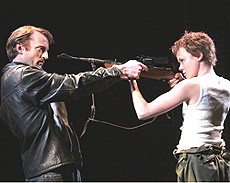
Much has been said of the extraordinary nature of McDonagh's story - he left school at 16, sat around all day watching soap operas and listening to The Clash, then took inspiration from his brother, who was starting to do well in screenwriting, sat down and churned out seven plays in nine months. The rest...history...Broadway...an Oscar...and all of that. But there's also something extraordinary about Domhnall Gleeson, who plays the hapless (suspected) cat-impaler Davey, given that this is not just his first time on Broadway, but his first time in a play. Ever. 23 years old he avoided acting until now for fear of accusations of nepotism - his dad is Brendan Gleeson. He's had minor parts in a few short films, but this is his first time onstage, and it's impressive. OK, it's not as though he's playing a part of deep gravitas. For all its engagement with heavy themes, the play is basically a romp. But I still think Gleeson is one to watch. Especially if he happens to be throwing a cat basket out of a cottage window when you're watching him. I don't know why, but that made me cry with laughter. That, and a joke on a subject I'd have never, ever imagined as possible joke material - Bloody Sunday. Yeah, I know, it doesn't sound right. But it works. Savagely so. 
Posted by
hesitant hack
at
11:13 AM
6
comments
![]()
Labels: theatre
Friday, June 16, 2006
End of the Witchhunt
 So the good name of the Hunt Museum has been cleared, and the charges of Nazi connections no longer hold water. Pity this comes too late for John Hunt, the director of the Museum, who died two years ago, aged 47, when the looting controversy was at its height. His final months would have been hard enough without this nightmare.
So the good name of the Hunt Museum has been cleared, and the charges of Nazi connections no longer hold water. Pity this comes too late for John Hunt, the director of the Museum, who died two years ago, aged 47, when the looting controversy was at its height. His final months would have been hard enough without this nightmare.
Posted by
hesitant hack
at
10:30 PM
0
comments
![]()
Labels: arts (ireland)
Thursday, June 15, 2006
LIke Rain on Your Wedding Day, This May Not be Ironic...
 A thinks this letter to today's IT was written with tongue firmly planted in cheek. I'm not so sure. Any casting votes?
A thinks this letter to today's IT was written with tongue firmly planted in cheek. I'm not so sure. Any casting votes?
Madam, - The passing of Mr Haughey was one of those occasions when one just has to buy The Irish Times: a field day for your esteemed journalists to show their considerable talents. One recalls all the many occasions when that photogenic face graced your pages, all the acres of newsprint that have been expended on account of its owner.
Might I venture to suggest that some small acknowledgement of his value to the media is called for? Would it not be appropriate for your paper to take the lead in making some little donation to his estate, as a gesture of appreciation? - Yours, etc,
JOE ASTON, Sherkin Island, Co Cork.
Posted by
hesitant hack
at
9:55 PM
4
comments
![]()
Labels: irish media, letters
Swagbag update
Dear people who find their way to this blog by doing Blogger and Google searches for various items that were in the Tonys goodiebags (sample search: [product in question] + Tonys + gift + bag):
Please desist. If you're hoping that Cynthia Nixon or Mark Ruffalo keep blogs, and that they're using them to rave about the tacky rubbish you gushingly bestowed on them backstage at the awards last weekend, and giving you lots of free publicity that you can use in your next missive of dropped apostrophes and excessive exclamation marks...I mean, your next press release...well, you're sorely mistaken. So go away, and take your furry boots and gaudy jewellery with you. Instead, here are some pictures of "celebrities" (including Mary Poppins and Doogie Howser) looking like total sell-outs in your Celebrity Presenter Gift Lounge™.



Love, Me.
Update: On the other hand, to the person who found their way here through a google search for "giving to arts journalism": come back, come back! You can give as much as you want...
Posted by
hesitant hack
at
7:30 PM
0
comments
![]()
Labels: mindless trivia, New York
Speaking of Cash...
Here he is, doing a flirty duet with Odetta on his television show in 1969. I'd love to see some more tapes of that show; it looks like it would have made for some juicy viewing. See that twinkle in his eye?
Posted by
hesitant hack
at
12:26 PM
0
comments
![]()
Wednesday, June 14, 2006
I Feel Better Now

There's an interview here with Gyorgy Faludy, the Hungarian poet, who is 96 and looks spookily like a guy who used to live across the road from me in Stoneybatter (except that guy was probably 46...that's what having your own snug in Walshes will do to you). He believes, basically, that literature is doomed; that reading and dialogue are in decline and that what's approaching is a crisis in literature to rival the one which occurred in 350 AD, under Constantine the Great, when "people stopped reading." Well, that's a bit dramatic, I think. It's the material people read, and the way they read, which is undeniably changing, but I do believe that there will always be readers of good literature. Even if that literature is on a screen rather than in book form; Sinead wrote about this today, and like her, I don't think I could ever read a novel in electronic format. The experience of being with the book is part of the experience of reading it.
But this wasn't the passage in the Faludy interview which first caught my eye. No, as I survey the mass of looming and unmet deadlines stretching before me, it was his answer to a question about how he chooses which books to read that gave me hope. I'm more than a month behind on one of my longer pieces, an essay for an academic publication here. Every morning I wake up in dread of seeing the "Forget about it, you unreliable pup" e-mail from the editor in my inbox. But tomorrow, if I get that e-mail, I'm just going to refer her to the wisdom of Gyorgy Faludy:
After the success of Villon, in March 1938, I offered some of my poetry translations to the publishers Uj Idok. They offered me a contract to translate the 1000 most beautiful poems in world literature. When the publisher's head, Miss Andrassy, who looked rather like a woman from an Italian renaissance painting, asked me when I'd have it ready, I asked for four years. "I have a lot of reading to do: I'll submit the manuscript after the World War," I said. She replied: "After the World War? It's already been." She couldn't believe there'd be another. In the end, we agreed on a deadline of 1942. I finally completed the first version of the anthology in spring 1988. It's now being reissued, with another 500 poems. I don't regret chasing down great poems all my life. I learned something that few people know: that Japanese, Chinese, Persian and Arab poetry has just as much value as European poetry.
Six weeks over? Call that late? Why, it's positively premature!!
(If you're reading this, by the way, Ms. Editor, I am nearly finished. Nearly. Honestly. Faludy.)
Posted by
hesitant hack
at
8:11 PM
1 comments
![]()
Go Touché Yourself, Mr President
 Beautiful. Just beautiful. At a press conference this morning, President Bush mocked a reporter from the L.A. Times who stood up to ask a question wearing sunglasses. Transcript below:
Beautiful. Just beautiful. At a press conference this morning, President Bush mocked a reporter from the L.A. Times who stood up to ask a question wearing sunglasses. Transcript below:
THE PRESIDENT: Yes, Peter. Are you going to ask that question with shades on?
Q I can take them off.
THE PRESIDENT: I’m interested in the shade look, seriously.
Q All right, I’ll keep it, then.
THE PRESIDENT: For the viewers, there’s no sun. (Laughter.)
Q I guess it depends on your perspective. (Laughter.)
THE PRESIDENT: Touché. (Laughter.)
And???? The reporter is legally blind. Unlike any seat of justice that Bush and his administration have recently had to answer to.
Update: The President has apologised. Well, he kind of had to, didn't he?
Update 2: Here's the question asked by Wallstein, and the answer (cough) given by the President:
WALLSTEIN: Following up on the other Peter’s question about Karl Rove, you said that you were relieved with what happened yesterday. But the American public, over the course of this investigation, has learned a lot about what was going on in your White House that they didn’t know before, during that time, the way some people were trying to go after Joe Wilson, in some ways. I’m wondering if, over the course of this investigation, that you have learned anything that you didn’t know before about what was going on in your administration. And do you have any work to do to rebuild credibility that might have been lost?
THE PRESIDENT: I think that — first of all, the decision by the prosecutor speaks for itself. He had a full investigation. Karl Rove went in front of the grand jury like — I don’t — a lot of times. More times than — they took a hard look at his role.
Secondly, as I told the other Peter, I’m going to tell you, that there’s an ongoing trial, it’s a serious business. And I’ve made the comments I’m going to make about this incident, and I’m going to put this part of the situation behind us and move forward.
Posted by
hesitant hack
at
3:53 PM
4
comments
![]()
I Hear The Train a Comin...
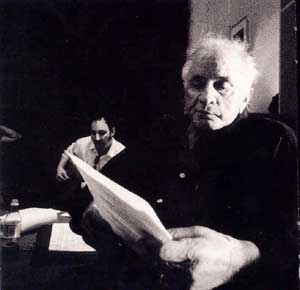 Johnny Cash’s American Recordings V is on its way: July 4 is the release date.
Johnny Cash’s American Recordings V is on its way: July 4 is the release date.
John Kelly is playing "Like the 309", the last song Cash recorded before his death, on The Mystery Train right now. And others from the album (Gordon Lightfoot's "If You Could Read My Mind" and the last song on the album, "I'm Free From the Chain Gang now").It already sounds magnificent. And this sort of radio, RTE, is why you should not have cut the best thing on your airwaves. Sorry to go on about this, but you've been stupid enough to deserve to hear it ad nauseam.
Update: You can listen to the programme in question here. The Cash stuff comes about halfway through, after all the Polish and German songs, which marked Tuesday's World Cup match.
Posted by
hesitant hack
at
3:21 PM
4
comments
![]()
Labels: irish media, music
Sorry....what?!
 This "press release" just landed in my inbox (and that of every journalist in Ireland, by the looks of the cc. list). It comes from Visual Arts Ireland and the Irish Playwrights and Screenwriters Guild. And I'd like to know just how they have worked out that they speak for ALL Irish artists in the very debatable first line. Hey, let's all issue press releases on behalf of communities we haven't bothered to contact first. OK, let's assume they contacted every single visual artist, playwright and screenwriter in the country. That still leaves a lot of people in the category of "artist" who are being spoken for here, on a very contentious matter.
This "press release" just landed in my inbox (and that of every journalist in Ireland, by the looks of the cc. list). It comes from Visual Arts Ireland and the Irish Playwrights and Screenwriters Guild. And I'd like to know just how they have worked out that they speak for ALL Irish artists in the very debatable first line. Hey, let's all issue press releases on behalf of communities we haven't bothered to contact first. OK, let's assume they contacted every single visual artist, playwright and screenwriter in the country. That still leaves a lot of people in the category of "artist" who are being spoken for here, on a very contentious matter.
Yes, the tax exemption scheme is a good thing for artists. But that doesn't mean that artists have to get down on their knees and join the current revisionist hysteria.
PRESS RELEASE
Irish artists owe a debt of gratitude to Charles Haughey, regardless of their personal or political views and affiliations, a debt they want to acknowledge.
In a time of rapid and radical economic and cultural development, art plays an essential, often unrecognised role in identifying and examining the impact – individual and societal – of the many and often unexpected changes that are occurring. Charles Haughey made tangible his recognition of the role of artists in Ireland.
The income tax exemption scheme for artists, introduced when he was Minister for Finance in 1969, has been hugely beneficial to artists living here and has been recognised by the artistic community worldwide as visionary in its impact.
Posted by
hesitant hack
at
10:30 AM
0
comments
![]()
Labels: arts (ireland)
Dick and Jane go to the IMPAC awards
 Is it just me, or is there something bizarrely childlike about this NY Times headline about Tóibín's IMPAC win?
Is it just me, or is there something bizarrely childlike about this NY Times headline about Tóibín's IMPAC win?
What next? Karl Rove is a Good Boy?
Posted by
hesitant hack
at
10:11 AM
2
comments
![]()
Next up for Cancellation: Music, Theatre, Literature, Painting, etc, etc...
 Turns out Colm Tóibín won't be the only Irish writer to be outHaugheyed on his big day: Bloomsday Cancelled to Make Way for Crocodile Tears.
Turns out Colm Tóibín won't be the only Irish writer to be outHaugheyed on his big day: Bloomsday Cancelled to Make Way for Crocodile Tears.
And you can rail against the RTE arts cancellations here , where a petition has been set up. Although, technically, this is a petition for Rattlebag only, people are also using it as a platform to air their disappointment about the cancellation of John Kelly's Mystery Train programme. Nothing wrong with that.
Posted by
hesitant hack
at
8:53 AM
0
comments
![]()
Labels: arts (ireland), irish media
Tuesday, June 13, 2006
Scrap Flatterday
 Two choice quotes from the speakers Vincent Browne had on the line for his Charlie special tonight:
Two choice quotes from the speakers Vincent Browne had on the line for his Charlie special tonight:
"He could walk with kings and talk to...eh, to the lower classes." (some FF local politician eager to tell, again and again, how Haughey took him to his house for a drink once.)
"People didn't realise, he needed those Charvet shirts to meet with people just like him in Europe." (Noelle Campbell Sharpe. Who else?)
Add to that Browne's insistence on asking his panellists (male, of course) how many times they slept with Haughey. It was a bugging scandal, Vinnie. Bugging.
I agree with Jane on this one. Who is this guy they're all fawning and LYING about? And Bertie, what you said in the Dáil today about "de credits and de debits" was not just incoherent and full of mixed metaphors, it was untrue. God, when Irish politicians, the vast majority of whom would normally defect to a rival party rather than be linked to the arts, have to resort to repeatedly referring to someone as a patron of the arts first and foremost as a way of speaking positively about them, you know hypocrisy's in the house. Ah well. That sort of bull is as apt a summation of Haughey's legacy as any, I suppose.
update: I've fixed the link to Jane's blog; it's the entry for June 13th that I'm referring to. She's always good on worthless politicos, appalling Irish radio and the like.
Posted by
hesitant hack
at
4:58 PM
1 comments
![]()
Labels: irish media
IMPAC: The Right Winner
Irish author Colm Tóibín has won the International IMPAC Dublin Literary Award for his novel The Master, a portrayal of American writer Henry James.
Mr Tóibín, whose previous novels include The South and The Blackwater Lightship, is the first Irish writer to win the world's richest literary prize-worth €100,000 - for a single work of fiction published in English.The Master was chosen by an international panel of judges, fending off competition from nine other writers.
The judging panel described The Master as "a powerful account of the hazards of putting the life of the mind before affairs of the heart." "This probing portrayal of Henry James is not merely an outstanding narrative. In crisp, modulated writing, it subtly balances a range of devices that leave the reader in no doubt about the accomplishment of this work.
"The Master is and will continue to be a work of novelistic art: its preoccupations are truth and the elusiveness of intimacy, and from such preoccupations emerge this patient, beautiful exposure of loss, and the price of the pursuit of perfection.
But it's a very good thing you didn't call your novel The Boss. Talk about having your thunder stolen...
Update: Tóibín has just been on the News at One to give his views on Haughey: unlike most of the assembled journalists, editors, etc, he didn't mince his words, mentioning Charlie's pomposity. But he also pointed out that he has a lot to thank Haughey for today. Because were it not for Haughey and the tax exemptions he introduced for artists in 1969, Tóibín would have to pay enormous tax on the €100,000 prize he has just netted. And €100,000 is still well under the €250,000 cap that was introduced on the exemptions scheme in last year's budget.
Posted by
hesitant hack
at
7:16 AM
0
comments
![]()
Sunday, June 11, 2006
Tony Awards Live 4
 Just heard someone behind me on the phone to their mother, telling her that they just saw Cynthia Nixon. “What? No, Mom, not President Nixon, Cynthia Nixon!”
Just heard someone behind me on the phone to their mother, telling her that they just saw Cynthia Nixon. “What? No, Mom, not President Nixon, Cynthia Nixon!”
Nixon was pleasant and bland, talking about shoes (hers are comfortable so that she can last the longest at the afterparty), singing lessons and the need to nurture new writing, which seems to be the buzz phrase of the evening.
Alan Bennett came! He is so sweet. Bowtie crooked. Still here, talking in a very bumbling and bashful fashion about the success of the play and what he’s doing next. Last time he was on Broadway with a play was in 1962, with Beyond the Fringe, (“before any of you were born, I’d imagine,” he says to the room of journalists, making the considerable quotient of fiftysomethings in here very well disposed to him indeed, I’d imagine. "I haven't followed the history of the Tonys since," the '60s, he observes. "I had no idea it had become such a big deal." A reporter puts his hand up to congratulate him on the fact that The History Boys has just tied the record for most Tonys won (6) by a single play. Bennett clearly doesn't believe him - Angels in America, he thinks, holds the title. Turns out the journalist was right.
Bennett's not working on another play, because he gets so many letters about his memoir, Untold Stories, that he spends all day replying to them (“it’s not a joke, really”) and he’s unlikely to be bringing his play The Lady in the Van, to New York unless Maggie Smith comes – and she won’t come, she says, unless he plays himself in it. And he gets stagefright now, he says. “I don’t think I’d even be able to play myself.”
Posted by
hesitant hack
at
10:12 PM
2
comments
![]()
Tony Awards Live 3
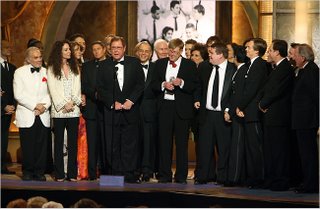
The History Boys just won Best Play. Alan Bennett, along with the producer, accepted the award...and the ENTIRE cast and crew trooped up on the stage along with them. Very short speech from Bennett, talking about how they were nervous bringing the play to Broadway and worried it wouldn't be understood by New York audiences. Actually, the night we were there, it was the sections of the audience from parts of America other than NY (the tourists from the Midwest, etc) who were hissing to each other in bafflement at the accents. Anyway. The RTE boys have just gone home, because there's no reason to stay around here any longer now - that's it for the Irish nominees. But I'm hoping they'll bring Cynthia Nixon up here, and Richard Griffiths, and maybe even Alan Bennett (unikely), so like a good little starstruck hack, I'm staying put. Plus, there are strawberries, With chocolate on them.
Poor Martin. And he looked so good in that tux...
Gad. Cynthia Nixon just came in. She's THIN. Whining about the strong lights, but otherwise pleasant. Or is that bland?
Posted by
hesitant hack
at
9:36 PM
0
comments
![]()
Tony Awards Live 2
First Anti-Bush joke of the evening. Actually, it's probably going to be the only one. Something about a Republican puppet. And when you've seen it (earlier on, they let me into rehearsals by mistake) being practiced over and over until it's done right, it sort of loses its magic. But still. Loud applause, etc.
Christian Hoff won best Featured Actor in a Musical and cried, and thanked the Lord, and talked to the unborn baby in his wife's womb. God. Somebody else make a puppet joke and get that man off the stage.
Oooh! Julia Roberts is announcing the Best Actor award next. G'wan David Wilmot!!!!
Update: Wilmot would have gotten the award for incredulity-at-being-here if there was one (his expression when the camera closed in on him was priceless), but Richard Griffiths won (so there, Ralph Fiennes). He gave such a long speech that they did the play-the-music-so-he'll-leave thing eventually; relished his 6000-strong audience and quoted the Walt Whitman line from the play, and I think he even sort of shrugged off the bony usher woman who seemed to be trying to steer him away from the podium. Good man! Cynthia Nixon, on the other hand, who won Best Actress, was BORING...and, as the guy from the San Fran Lesbian Gay Times beside me at the red carpet said when he saw her, where the hell was her girlfriend? And why no mention or thank you? Come to think of it, for a theatre awards ceremony, there was a depressing dearth of gay couples out there tonight. So everyone in NY theatre is straight and married? Yeah, right.
Fair play to Julia Roberts for prefacing her scripted introduction to the Best Actor award by saying to the actors in the audience "you people are insanely talented" in a very pointed fashion. A reference, I would think, to her discovery that being on stage is damn, damn hard, and not at all like film work.
What's left of the Irish hopes now? Best Play and Best Lighting Design, I think. So that's that...
Wait! Bob Crowley just won for Scenic Design - not for Tarzan, but for The History Boys. He's Irish....and begrudging with it: "Thanks very much. But between me and you, I should have won for the other one," he said.
Posted by
hesitant hack
at
8:51 PM
0
comments
![]()
A bit of a live blog: The Tonys, I
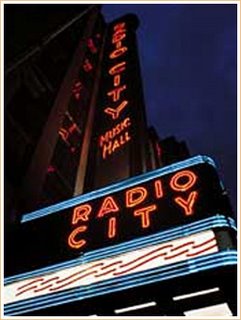 Now this is what I call an Empire State View. Sixty-four stories above Manhattan, in the Tonys media room, the Empire State herself on one side, the Hudson and Central Park on the other. It’s a pretty good set-up here, with lots of food and drink and a spot with internet access for every journalist, but I’d still prefer, obviously, to be across the road in Radio City Music Hall, where they’re rattling through the ceremony at a brisk pace. Faith Healer was the first winner of the evening, with Ian McDiarmid (below) getting the award for Best Featured Actor. He gave a brief speech about how the play was one of the most musically perfect pieces for stage in the English language…wonder what all the musical people present made of that…and then came back here and talked about Brian Friel for a bit. He seemed genuinely thrilled. This is his Broadway debut, at 61. The History Boys won for Best Director and Best Featured Actress, Nicholas Hytner and Frances de la Tour respectively. He went on a rant about how English theatres got so much money from the government and American theatres should too, and she talked for the zillionth time (it wasn’t her fault, people kept asking the question) on what it was like to be the only woman in a cast of men. What did she draw on? “Sixty years.” How do the young guys in the cast regard her? “They call me J-La”.
Now this is what I call an Empire State View. Sixty-four stories above Manhattan, in the Tonys media room, the Empire State herself on one side, the Hudson and Central Park on the other. It’s a pretty good set-up here, with lots of food and drink and a spot with internet access for every journalist, but I’d still prefer, obviously, to be across the road in Radio City Music Hall, where they’re rattling through the ceremony at a brisk pace. Faith Healer was the first winner of the evening, with Ian McDiarmid (below) getting the award for Best Featured Actor. He gave a brief speech about how the play was one of the most musically perfect pieces for stage in the English language…wonder what all the musical people present made of that…and then came back here and talked about Brian Friel for a bit. He seemed genuinely thrilled. This is his Broadway debut, at 61. The History Boys won for Best Director and Best Featured Actress, Nicholas Hytner and Frances de la Tour respectively. He went on a rant about how English theatres got so much money from the government and American theatres should too, and she talked for the zillionth time (it wasn’t her fault, people kept asking the question) on what it was like to be the only woman in a cast of men. What did she draw on? “Sixty years.” How do the young guys in the cast regard her? “They call me J-La”.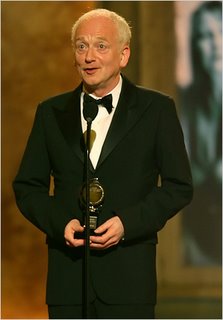
Faith Healer lost out in Best Revival of a Play, which went to Awake & Sing. John Doyle, another British director, won for Direction of a Musical, with Sweeney Todd, and The Drowsy Chaperone seems to be winning all the other musical awards (sorry, I just can’t absorb information about musicals. It’s nothing to be proud of, I just don’t take it in.)
Heee, I think the Americans are getting a bit pissed off with all the British directors coming in here and talking about money and ticket prices and the other cold hard economic facts of theatre. John Doyle has just taken a question from a British journalist about ticket prices, and he’s answering pretty passionately (prices are rising in Britain too, becoming almost as ridiculous as Broadway), and you can just feel the boredom in the room. They should count themselves lucky they won’t have to listen to Michael Colgan talking about how he runs the Gate on a fraction of what the Abbey gets…
After the jump, some red carpet observations and pics...
This was my first time covering a red carpet do; I was late for the opening of Faith Healer on Broadway a couple of weeks ago, just getting there in time for the beginning of the play, and missing all the celebrities-and-flashbulbs activity beforehand...I did get to run up the red rug myself though - it was more panting and perspiring than preening and posturing. But that wasn't nearly as big a deal as the Tonys, for which two whole streets of midtown Manhattan were closed for 12 hours, with cops everywhere and something like 600 journalists. It was quite the rite of passage. Dozens of uniformly thin, uniformly blonde, uniformly stern-faced PR women barking us all into queues, into submission, and eventually, into place. "Place" being a tiny, tiny spot behind the barricades. Journalists stood pressed against each other, the ranks at least two deep, cameras banging into each other's heads and notebooks getting into each other's shots. Remarkably, tempers remained calm - but then, I had been placed on the...um, special interest (read: not really important to the PR people) end of the line, it seemed. Beside me were reporters from couple of LGBT publications from California, an insane woman from a Midwest newspaper, and a very young looking girl from NYU radio who, for some unknown reason, was dressed in full evening regalia and had a camerawoman with her. For radio, sweetheart. Weren't you overspending the budget somewhat? Anyway. I didn't care. These people were more fun, I'll bet, than the sharks from Entertainment Weekly and Access Hollywood, who got the premium spots at the other end of the carpet.
Lots of jostling for position and craning of necks to see if anybody important had arrived yet; for a good half hour, nothing. Thousands of fans gathered on the other side of the road, behind another set of barricades; their view was terrible, because the journalists stood between them and the red carpet. Still, they stood and cheered every tinted-glass limo and SUV that pulled up. And the limos were starting to come, and the screams of the crowd suggested that someone had arrived. Not that we could see anything. Except a seven year old girl who was chillingly skilled at the art of preening, walking nonchalantly around at our end of the carpet - turned out she was Kate Burton's daughter, waiting for her mother to make her long journey from the other end. And at our end, another odd thing was happening. And at first, it looked very bad indeed. Lots of people in evening dress - the sort of people you'd imagine should be walking the red carpet with all the other eveningfrocked people - were gathering by the door to RCMH, sort of huddling together, and being snubbed by the legions of publicists and photographers stood between them and the journalists. Looked like these people weren't allowed to walk the red rug. Looked like they were kind of forced to play second fiddle to the "real" stars. Looked like they were being sort of humiliated. Looked bad. And oh, did I forget to mention that all of these people were black?
Well, I needn't have worried. Rampant racism was not, after all, stalking the Tonys. (Although *cough* there weren't that many non-white people on the actual red carpet, as opposed to its Edge Of Shame, either. Just saying...) Turns out that the people in question were, rather, paying guests, otherwise known in the business as the lowest of the low. They'd bought their tickets, and they'd paid for their own dresses and tuxedos, and they were standing outside the venue for as long as they could in order to get a gawk at the stars with whom they'd be sharing breathing space for the evening. "You don't want to look at those people," the journalist beside me cautioned, when she saw me looking curiously in their direction. "Those people are nobody."
Posted by
hesitant hack
at
7:31 PM
0
comments
![]()
Saturday, June 10, 2006
Might As Well Stay Home...
 If these predictions are anything to go by, the three Irish plays haven't a hope at the Tonys later on today. Looks like The History Boys and its star, Uncle Monty, will win everything, plays-wise at least, and as for the musicals, Drowsy Chaperone or Jersey Boys or something, who cares?
If these predictions are anything to go by, the three Irish plays haven't a hope at the Tonys later on today. Looks like The History Boys and its star, Uncle Monty, will win everything, plays-wise at least, and as for the musicals, Drowsy Chaperone or Jersey Boys or something, who cares?
Last night we went to see Adam Rapp's play Red Light Winter at the West Village theatre, the Barrow. It's a good spot, and the plays I've seen there have been of a consistently high quality. But, like most of the theatre I've encountered here, they've always had to them a hint of compromise, of second-best. Standards here are just lower, sloppier, without, it seems, anybody really realising or caring. Hyperbole is the critic's best friend here. They go crazy for anything sentimental, moody, angry, no matter how shallow or manipulative the employment or portrayal of those emotions may be. Red Light Winter is an o.k. play, and I'm glad I saw it, but it didn't deserve the glowing reviews it got in the establishment press here. It's about two best friends who sleep with the same prostitute in Amsterdam; one of them, a tortured playwright, falls in love with her, while she falls in love with the other, a macho idiot. The dialogue is snappy (too snappy at times) and there are genuinely powerful moments. And it gave me a chance to hear Tom Waits' Tom Traubert's Blues again, and reminded me to download all of Small Change this morning, and listen to it, so that's good. And yeah, good performances. But claustrophobic, and underdeveloped, and abandoned just when things were getting interesting. So all in all, another NY theatre experience. It's only when it comes to theatre that I ever really miss Dublin.
Posted by
hesitant hack
at
5:27 PM
0
comments
![]()
The Week in Covers
It was a week for walking past newstands and doing a double-take. Firstly, because of an undeniably-cute-but-scarily-hyped newborn: 
And secondly, because of an unbelievably-tawdry-but-scarily-typical headline/caption combination:
Once more with feeling: Yup, folks, this is America.
Posted by
hesitant hack
at
5:15 PM
0
comments
![]()
Labels: ads
Nice Work If You Can Get It
 Tomorrow, I'll have my first taste of celebrity reporting when I'm assigned my four square inches of a spot along the red carpet at Radio City Music Hall, to watch the stars arrive for this year's Tony Awards. I'm slightly dreading it, as I'm useless at the "Ralph! Julia! Will from Will & Grace! Er..David Wilmot! Over here!" style of journalism, preferring to sit with my subjects for hours on end and have long, rambling conversations that don't sound anything like an interview when I play back the tapes, provoking much last-minute panic, but actually lend themselves nicely enough to the writing-up process in the end.
Tomorrow, I'll have my first taste of celebrity reporting when I'm assigned my four square inches of a spot along the red carpet at Radio City Music Hall, to watch the stars arrive for this year's Tony Awards. I'm slightly dreading it, as I'm useless at the "Ralph! Julia! Will from Will & Grace! Er..David Wilmot! Over here!" style of journalism, preferring to sit with my subjects for hours on end and have long, rambling conversations that don't sound anything like an interview when I play back the tapes, provoking much last-minute panic, but actually lend themselves nicely enough to the writing-up process in the end.
So anyway. I'm not really relishing the prospect. Then again, Martin McDonagh will be there. In a tuxedo. Hmmm.
But before they let me near the red carpet tomorrow, I have to witness what sounds like a pretty crass phenomenon - the Celebrity Presenter Gift Lounge. The Swagbag room, in other words, where the famous names who'll be presenting awards on the night will be invited to "customize" (ugh) their own "gift bags" from the array of freebies donated by companies eager to get a bit of celebrity cachet. Personally, I'm looking forward to seeing Ralph Fiennes trying to maintain his signature elegant-and-aloof look while stuffing a goodie bag with Gucci sunglasses and UGG shoes. Not forgetting his spray tan and tooth whitening gift certs.
Down under, the full range of "gifts". $35,000's worth. (Or is that per gift bag? Hang on, I think it is. Ok, I have to lie down now.)
THE OFFICIAL PRESENTER GIFT LOUNGE COLLECTION:
Stars will roll away with Kipling’s Coast Tote & Las Vegas Trolley filled with over $35,000 of goodies! Highlights include:
Solstice Sunglass Boutique offers stars a choice of the season’s hottest designer sunglasses
from Gucci, Dior, Juicy Couture, Marc Jacobs, Girogio Armani and more;
Jabra JX10 state-of-the-art Bluetooth® headset
where style is the operative word - the perfect fusion of function and form;
Salt Works latest denim collection for men and women;
Chantelle Lingerie Essensia T-shirt Bra & Tanga embellished with Swarovski Crystals;
Essenza Automatic Espresso Machine & two month supply of coffee...from Nespresso
for the ultimate coffee experience;
UGG Australia’s Women’s Classic MINI – new for Fall 2006 – and Men’s Classic Ascot Driving Shoe;
Invicta Watches newest Anatomic Collection
featuring individually molded links of translucent ultra light thermo polymer -- in colors like Mango, Ocean Glass and Sun Ray;
Tahitian Noni International Luxury Bath & Body Gift Set..your ticket to pure pampering;
Stunning Details Handcrafted Semi-Precious Gemstone Jewelry;
Kumi Kookoon Silk Filled Travel Pillow and Silk Pillow Case with Silk Travel Slippers...
experience pure indulgence;
Keep a sharp eye out for the paparazzi, with perfect vision courtesy of
LASIK Surgery from Laser Eye Center of Silicon Valley;
Flash those pearly whites...courtesy of a beautiful
new permantly white smile from Lumineers;
Get in shape for next year’s award show season
with a 1-year Passport Membership to Crunch Fitness Nationwide;
Get revved up for the big night, with a private 2-day, 4-wheel drive training adventure
with legendary Bill Burke of Bill Burke’s 4-Wheeling America;
“Love on Broadway” by Eric Waugh - an 18” x 24” Broadway-themed Limited Edition Print on Canvas,
individually hand-painted by one of the most innovative and collected artists of fine art today;
PLUS more of the hottest merchandise trends including:
Spiegel Catalog Norma Kamali Timeless Convertible Tie-Waist Skirt, M.A.C Cosmetics Colour Box & Skin Care Box,
New York City Opera One-Year Associate Patron Membership, Saitek Industries A-250 Wireless Speaker System, Chronicle Books “A Must See”,
Am Rieys Industries American Chang Men’s Blazer, Dior Bois d’argent – an exclusive men’s cologne, Mario Russo 7 Wonders of the Hair World,
Left Field American Made Hand Appliquéd Tees, Coty Prestige Marc Jacobs Pretty Blush Holiday Gift Set, The Tao of Movement Private Pilates Session,
Kashwere Blanket & FurrMe.com Spa Products for your pampered pet, Archipelago Botanicals Signature Series Home Spray,
KangaROOS Sneakers, C-IN2 Industries Men’s Loungewear, FlipFlopTrunkShow.com Dressing Room Flip Flops,
Infinity Sun Spray Tan Gift Certificate, TIGI Hardcore Professional Flatiron, Peanut Butter & Co., Nature’s Gate Advanced Skincare Gift Set,
and gifts from Dr. Fresh, SweatLeaf Stevia, Herban Essentials, Silenze Beauty, Watersall, Pocket Books, Mary Green, Altoids & more!
Posted by
hesitant hack
at
4:28 PM
0
comments
![]()
Labels: New York
Thursday, June 08, 2006
Riders to The Sea....
 An anecdote from this year's Listowel Writers' Week arrived by email yesterday to cheer up (albeit guiltily) a rainy day:
An anecdote from this year's Listowel Writers' Week arrived by email yesterday to cheer up (albeit guiltily) a rainy day:
"This year they ran the Listowel Races at the same time as the Writers Festival. Literally. X swears that while John Banville read, it was slightly distracting that a horse in one of the races threw his jockey, crashed into a barricade and died! Apparently John didn’t (doesn’t?) know it was going on behind him.
The Untouchable, indeed...
Posted by
hesitant hack
at
9:20 AM
0
comments
![]()
Wednesday, June 07, 2006
Dull. Dull. Dull.

Look, New York, it's not like I moved here for the good weather, but you can stop messing around now, alright? If I have to read one more e-mail or blog entry from Ireland talking about the beautiful weather there, while out my window the Empire State Building is shrouded in mist and rain, and dreary grey skies push down with their pathetic attempt at warmth, I'm going right back to Dublin. Even 90% humidity would be better than this. No, wait. Wait. I didn't mean it....
Posted by
hesitant hack
at
11:04 AM
0
comments
![]()
Labels: New York
Tuesday, June 06, 2006
RTE: Supporting Old Wives' Tales
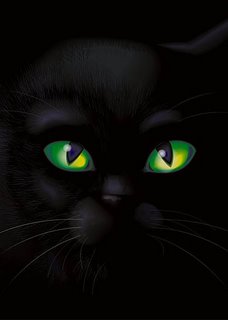 I can't believe what I've just heard on the RTE live stream, the 6 p.m. news. Tragically, five people drowned in accidents in Ireland over the bank holiday weekend. The bank holiday weekend. But what did the newsreader (Eileen Dunne) say? That this was the worst Whit weekend for drownings in Ireland in recent years.
I can't believe what I've just heard on the RTE live stream, the 6 p.m. news. Tragically, five people drowned in accidents in Ireland over the bank holiday weekend. The bank holiday weekend. But what did the newsreader (Eileen Dunne) say? That this was the worst Whit weekend for drownings in Ireland in recent years.
When I was little, my mother would never let us go swimming on Whit weekend, the weekend of Whit or Pentecost Sunday, because the superstition was that water should be avoided on this weekend. I never asked about the reason behind the superstition, but today, hearing that the national broadcaster thinks it enough of an authority to cite it in a report on the evening news, I looked it up online. Here's what the Irish Culture and Customs page says:
Water was completely avoided, for it was thought that the danger of drowning was very great. People didn't bathe or go swimming; the fishing and sailing boats were left idle; and it was considered very foolish to even walk along the edge of the sea, river or lake. The reason for this was based on an old superstition that all of those who had perished in that water rose up on Whit Sunday to try and persuade or force the living to join them.
Well, that's very interesting. And a bit spooky, if you're into that kind of thing. But it is NOT fact, and it is NOT something which should be referred to on the news. Whit weekend isn't even a term that most people use anymore. As far as most people are concerned, the past weekend in Ireland was the June Bank Holiday weekend. Why not just describe it as such? Why the reference to Whitsuntide, in an item on drowning? If five people had died in fires or in road accidents (and of course, too many people did this weekend, but that's not the point) would the newsreader have made the same reference? Hardly.
I don't know, maybe this is part of RTE's new policy of accessibility. Just think of all those old ones who were thinking of switching permanently over to Newstalk until they heard Eileen's nod towards the Ancient Ways, and now they're sticking with RTE for the rest of their days. Or all those disgruntled arts and music lovers who were disgusted by the loss of Myles and John...but wait! Superstition! That's "arts", right? That's creative, and alternative, and sort of, um, bohemian, right? Get all the hippies back on board? Good thinking, Ana Leddy. I can just imagine what the nine o'clock news bulletin will kick off with: "A bird has been seen in the house of a man in the Co. Longford area. A death in the house is expected within the next twelve hours, the Garda Press Office said. Funeral arrangements to be announced later. In other news, Gardai are not seeking anyone else in connection with the shooting of a young woman in the Tallaght area. Gardai stated that the young woman was last seen walking under a ladder, and the death is accordingly being treated as a suicide. The man apprehended at the crime scene pointing a shotgun at the woman's face has been released without charge."
By the way, RTE, if you're really going to follow this Whitsuntide business through to its logical (...) end, you should have a look at the other superstitions associated with the date. Apparently, any animal or human born on this date will die a violent death or cause the death of another, Deirdre-of-the-Sorrows style. But Irish Customs and Cultlore (whatever) goes on:
However, there was a simple way to avoid this fate and that was to have the infant creature kill something. Most often, a live insect was put into a baby's hand and the little fingers squeezed on it until the insect was dead. Having caused a death, the child was freed from the spell. A baby animal was made to perform the same ritual so that it too, would be saved from the ill-fortune of being born on this day. Counter charms such as this one were very common in old Ireland and were often used to protect against an evil influence.
Come on, RTE! Where's your coverage of all the newborn babies squeezing wasps and bluebottles to death? Forget all this Margaret Hassan coverage; that poor woman is already dead, after all. It's all about changing the future now. You're just not on the ball.
Posted by
hesitant hack
at
12:07 PM
1 comments
![]()

